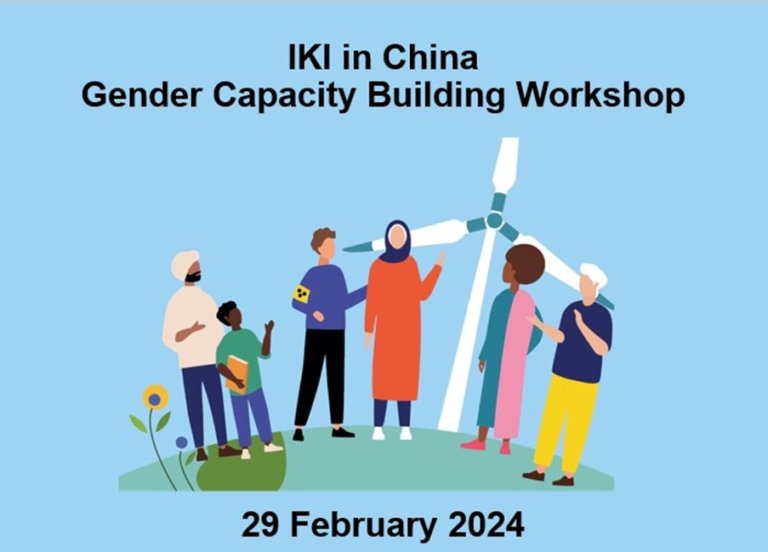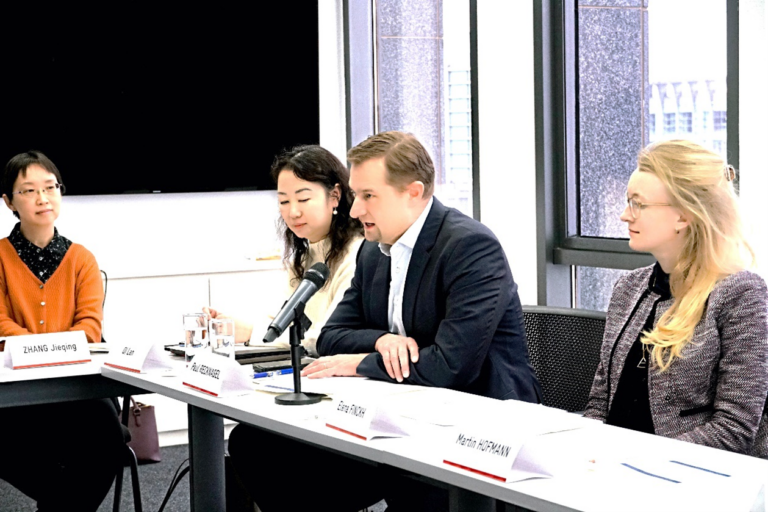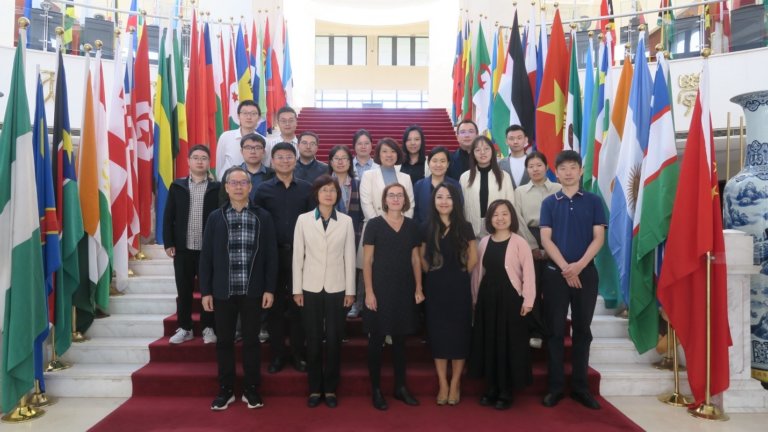The Deutsche Gesellschaft für Internationale Zusammenarbeit GmbH (GIZ) and the Institutes of Science and Development, Chinese Academy of Sciences (CASISD) jointly organised a hybrid workshop entitled ‘China-EU Expert Workshop on Climate Finance and Investment’ in Beijing on 10 July. The workshop was moderated by Mr Wang Yi, Member of the Standing Committee of the 14th National People’s Congress of China, and Professor and Director of the Center for Carbon Neutrality Strategy of CASISD. More than 40 representatives from governments, financial institutions, and academia in China and Europe attended the workshop.

Opening Speech
Mr Ding Hui, Division Director of General Affairs, Department of Climate Change, Ministry of Ecology and Environment of the People’s Republic of China (MEE), Ms Elena Finckh, Energy & Climate Officer of Economic Section, Embassy of the Federal Republic of Germany, Beijing, and Ms Chen Wenkai, Party Secretary and Vice President of CASISD attended the workshop and warmly welcomed the participants.
The workshop opened with a speech by Mr Ding Hui, who introduced the recent progress and work plans on climate finance pilots and financial innovation through mobilization financial institutions’ resources; he concluded by highlighting the need for international cooperation with Germany. Ms Elena Finckh then introduced the recent developments in the EU policy framework for sustainable finance and the China-EU Common Taxonomy, and summarised Germany’s national and international efforts. Ms Chen Wenkai concluded the opening speeches by providing an insight into the current status of climate finance and investment in China, emphasizing the need for both China and Germany to build a consensus and play a constructive role in promoting global climate governance.
Keynote Speech
Prof Tan Xianchun, Professor and Vice Director of the Center for Carbon Neutrality Strategy of CASISD, elaborated on China’s dual carbon policy framework, institutional innovation and progress of local climate finance pilots. She also reiterated the 1+N policy system in China and the role of climate finance in achieving dual carbon targets. Prof Tan explained the next steps should be accelerating the evaluation of pilots, promoting innovation of economic models and financial instruments, and strengthening robust capacity building and cooperation. Mr Ingmar Juergens, CEO and Co-founder of Climate & Company, presented the strategies and best practices of climate finance in Germany and the EU, emphasizing the importance of climate risk management, disclosure of sustainability information and transparency, and advocating for more peer-to-peer exchanges between different stakeholders in the EU, Germany, and China. As a case study, key specifications of the German Green Sovereign Bond and Twin Bond issuance were presented.
Expert Presentation
Mr Ye Yanfei, Counsellor of the Policy Research Bureau of the State Financial Regulatory Administration, shed light on the financing of low-carbon development. He spoke about the environmental benefits of green credit in China. His presentation also highlighted the work of financial institutions in conducting green performance assessments, the innovation of financial products under the dual carbon target, and the carbon emission reduction tools launched by the central bank. Prof Wang Can, Professor of the School of Environment and Director of the Faculty of Environmental Planning and Management of Tsinghua University, followed with an introduction to the project database of climate finance and investment. He provided MEE with a proposal on how to develop the project database in accordance with the local context and taking into account industry practices.
Mr Xie Wenhong, General Manager of Climate Bonds Initiative China Region, spoke about the opportunities for climate finance and investment under the China-EU Common Taxonomy. He pointed out that the value of the China-EU Common Taxonomy lies in identifying and comparing the consensus of different jurisdictions on sustainable finance standards, promoting comparability and mutual recognition of standards and their common use. In this way, the Common Taxonomy should reduce cross-border transaction costs and the risk of “greenwashing.” Katharina Lütkehermöller, Senior Policy Advisor of NewClimate Institute, presented best practice examples from European cities on climate finance. Presenting cases on municipal bonds, sustainability-linked loans, and the green budget approach, she alluded to the need to identify financing needs and prioritise climate finance projects to attract investors.
Panel Discussion
During the panel discussion, seven experts from public and private institutions discussed how finance can support climate change mitigation and adaptation goals. Ms Qi Lan, Co-Team Lead of the GIZ Climate Team, moderated the panel discussion. Mr Xiong Wei, COO of Greater China Corporate Client Department of Deutsche Bank, talked about how international cooperation on climate change is viewed from the perspective of private commercial banks. Ms Liu Yang, Division Head of Green Finance, Sectoral Department III, China Development Bank, briefed the participants on the crucial role of the China Development Bank in achieving the dual carbon targets. Ms Zhao Lu, Project Officer at the European Investment Bank (EIB), summarised the EIB’s main activities in China. As a European policy bank, the EIB not only attracts overseas investment, but also brings expertise in climate, forestry, energy, and transport.
Mr Sun Yiting, Standing Committee Member of the Climate Investment and Finance Association, shed light on the relationship between the government, market, and financial institutions. He explained the importance of financial viability for financial institutions, how markets respond to information disclosure, and the role governments can play in addressing externalities. Mr Wei Gang, Executive Director of the Disaster Risk Management and Catastrophe Insurance Research Center, Nankai University, spoke about the impact of climate risk distribution and the importance of integrating financial instruments into the public financial system. Ms Zhang Yuan, Associate Director Consultant of the Resources and Environmental Business Department of China international Engineering Consulting Co. Ltd., shared her insights on how to identify relevant projects and clients, particularly in the area of power grid and energy storage, where GIZ’s expertise in knowledge sharing can help promote capacity building. Finally, Mr Jia Qiumiao, Deputy Director of Beijing Climate Change Center, presented the work and policies of the Beijing Municipal Government in the climate finance pilot.
Participants included representatives from KfW, UNDP China’s Centre for Policy Studies, Société Générale, Sweden’s Scandinavian Banking Corporation Ltd (SEB), Bank of China’s Research Centre in London, and the Institute for Climate Finance at University College London (UCL), among others. The workshop helped to share knowledge and improve mutual understanding on the subject. Participants appreciated the in-depth discussion from varied stakeholder perspectives.



